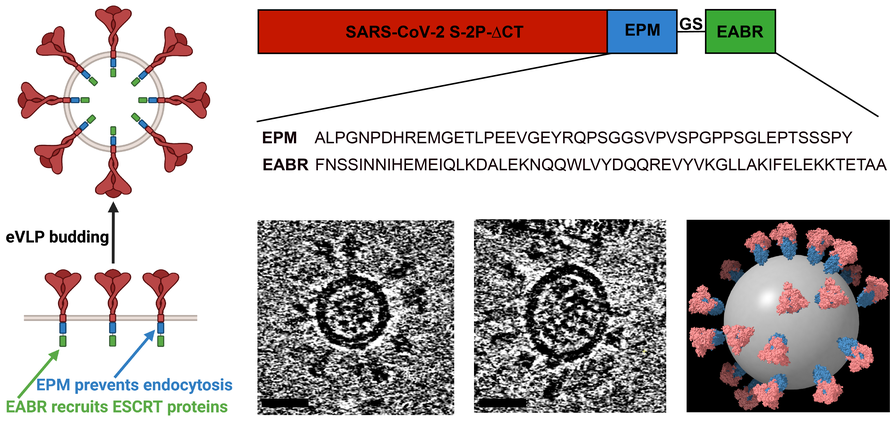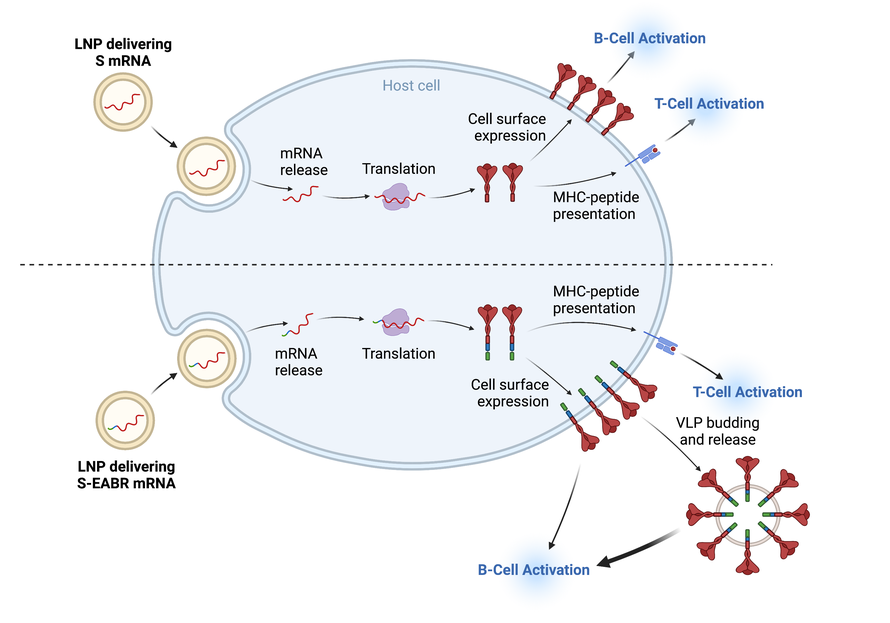Research
EABR Technology
We developed a technology that engineers membrane proteins, including viral glycoproteins, to self-assemble enveloped virus-like particles (eVLPs) that bud and are released from the plasma membrane. eVLP assembly is achieved by inserting a short ESCRT- and ALIX-binding region (EABR) into the cytoplasmic tail that recruits proteins from the Endosomal Sorting Complex Required for Transport (ESCRT) pathway, thereby bypassing the need for co-expression of viral capsid proteins to drive nanoparticle assembly. The EABR approach represents a technological advance in the nanoparticle field as it vastly improves nanoparticle production efficiency and simplifies the production process compared to other nanoparticle platforms, which could boost the development of nanoparticle-based vaccines and therapeutics in a wide range of fields.
Hybrid mRNA Vaccines
The EABR technology enables genetic encoding of self-assembling eVLPs to generate hybrid mRNA vaccines that mimic natural infection, which involves intracellular translation of viral proteins and secretion of viral particles, by combining attributes of mRNA- and protein nanoparticle-based vaccines. We have shown that our hybrid mRNA vaccine approach elicits potent CD8+ T cell responses and superior antibody responses against original and variant SARS-CoV-2 compared to conventional mRNA- and protein nanoparticle-based vaccines in mice, including >10-fold higher neutralizing titers against Omicron-based variants. These results suggest that dual presentation of viral antigens on cell surfaces and released eVLPs promotes B cell activation leading to enhanced antibody potency and breadth. This hybrid mRNA vaccine strategy could impact the ongoing pandemic as licensed bivalent booster shots increase neutralizing titers against Omicron-based variants by only ~1.5-fold, and could represent a technological advance against future pandemics as it might induce long-lasting protection against emerging viral variants and limit the need for frequent and updated boosters.
Current Projects
Our research focuses on five main areas:
1. Continued pre-clinical development of our SARS-CoV-2 hybrid mRNA vaccine candidate
2. Optimization of the EABR technology to enhance the effectiveness of hybrid mRNA vaccines
3. Application of the hybrid mRNA vaccine platform to design and evaluate pan-coronavirus, influenza, HIV-1, and cancer vaccines
4. Study hybrid mRNA vaccine-induced immune signatures through immunological, biochemical, and structural characterization
5. Engineer EABR eVLPs for targeted delivery of nucleic acid-based therapeutics


